They’re cute. They chirp and flirt around, scurrying from one food source to another. But don’t deceive yourself. If you love your garden, you don’t want to be overrun by chipmunks. One chipmunk means many chipmunks.
They’re rodents, and like mice and rats, they multiply quickly and they love to dig. They dig holes in your yard and garden, making tunnels from one end of their domain to another. They dig up bulbs and devour them, leaving half-eaten bulbs scattered as evidence of their destruction.
https://www.instagram.com/p/BGCRn_XB5ah/?tagged=chipmunkholes
Cute? Messy and destructive is more like it. So how do you repel chipmunks and discourage them from destroying your garden? And how do you do this naturally, without poisons and chemicals? There really is no great remedy because unfortunately, chipmunks are rather clever. But, there are ways to slow down their progress of mass destruction.
Chemical Repellents
There are chemical repellents available on the market, and some work while others don’t. The one that really makes me chuckle is called “coyote pee”—though I don’t recall the brand name. But, really? How was this collected?
I did try it but with little, if any, positive benefits. It’s a liquid, so it absorbs into the soil, and at the first rain, it’s washed away. You would think my dog doing his business on a daily basis all over the property would help. Even his barking only scares them away temporarily.
Barricading Potential Entryways
The key is to be innovative in your methods of eliminating the problem without being cruel. The first thing you can do is remove all feeding sources, like bird feeders. Being a bird lover, that was not an option. So, we compromised and moved the feeders further away from the house and gardens, thus discouraging chipmunk activity where we didn’t want it.
I had a chipmunk dig between the house foundation and the interlock tiles. Like mice, chipmunks can squeeze into very tight spaces. The chipmunk obviously felt very proud of itself, sliding in and out, depositing hoards of foodstuffs, probably preparing for winter. I didn’t want to risk further damage or the possibility that it might find a crack in the foundation, just big enough for it to squeeze into the house.
https://www.instagram.com/p/BbR6OMJll2U/?tagged=chipmunkproblems
I found some plastic garden edging and stuck it firmly into the crevice that it had created. The chipmunk was not amused. As it started pouring rain, the critter chewed and pulled on the plastic edging, but to no avail, wailing in protest at the loss of its stash of goodies. It must have spent over an hour, in the pouring rain, trying to remove the edging that blocked its access.
The chipmunk did eventually give up and move on. Thankfully. Others moved in and tried their own wily tactics. I continued to stand guard and encourage them to find a home elsewhere. My home is my garden, and I protect it with a vengeance. Naturally, of course.
The Problem With Chipmunk Holes
When we first moved into our country home, the backyard was full of holes. Chipmunk holes. These critters burrow tunnels from one end of their domain to another. Our fenced-in backyard is the dog’s sanctuary as well as a training space.
Duke, a Border Collie/Australian Shepherd mix, is, as you can imagine, full of energy and needs a safe place to run. He’s also an agility dog, so the backyard required a hole-free surface on which to run without breaking his leg. Chipmunk holes, often well hidden, are large enough for a dog’s paw to sink into and, at Duke’s breakneck running speed, this could be quite catastrophic.
Filling The Hole With Sand And Gravel
I didn’t want to use poisons. Not only would that be cruel to the chipmunk, but it was dangerous for Duke as well. Fortunately, a lot of the land around the backyard was very sandy.
https://www.instagram.com/p/BUSGQI0gUbT/?tagged=chipmunkproblems
On a daily basis, before Duke was allowed to run in the backyard, I would pace the yard and fill all the chipmunk holes with sand and sometimes fine gravel. There’s nothing more difficult for anyone, let alone a chipmunk, than trying to dig a hole and tunnel through sifting sand and gravel.
Filling The Hole With Water
Another tactic I used was to put the hose in the hole and fill it and the tunnel with water before adding sand. It was not a danger to the chipmunk whose instinctive dislike of being wet would have it scurrying out the other end of his tunnel at the first sign of a flood.
As I continued my battles in the backyard, holes and destruction appeared in my garden plots. I set up humane traps and managed to catch the critters, one at a time, which I then transported a good distance away, making sure to cross a body of water.
https://www.instagram.com/p/Bbdc51ul0IS/?tagged=chipmunkproblems
However, on reflection, I decided this was unfair to other homesteaders trying to deal with their own chipmunk problems.
When Chipmunks Attack
The defining moment was when our brand-new car started leaking gas. We took it to the service department, hoping that the fix would be under warranty since the car was less than a year old. No such luck. A chipmunk family had built a nest along the gas line, chewing through the line itself. There was one baby still in the nest, which the service technician showed us as proof of the cause of the destruction. On hindsight, the situation could have been quite serious had someone thrown a lit cigarette our way as we drove to have the car serviced. Ka-boom. No thanks.
The new gas line was installed, at considerable expense to us. I did more research and learned that farmers frequently had difficulties with mice and chipmunks nesting in their tractors and other farm equipment, making the large, costly machines inoperable. My research provided some suggestions.
Deterring With Scent
I put dryer sheets in various locations in the car, including the glove compartment. The smell was a deterrent. I also bought some very smelly Irish Spring soap bars and put some in the car. Deodorizing contraptions that you hang on the rear-view mirror work well, too, but, with my allergies, this didn’t work too well.
https://www.instagram.com/p/BLFR40BgZ35/?tagged=deerrepellent
I also purchased in bulk strong smelling spices, and anything that might encourage sneezing, like chili powder, to sprinkle around the car. This I repeated after each heavy rain, which, obviously, washed away the spice.
Plant Garlic
As for my gardens, I’ve planted lots of garlic. Chipmunks don’t like garlic. I’ve also planted lots of spearmint, which does take over but discourages both chipmunks and other rodents like red squirrels, which are just as much a destructive nuisance as the chipmunks.
Recycling Soapy Water
An age-old remedy of my grandmother’s also works well: recycling used dishwater or used soapy laundry water by dumping it on the gardens. This may not be as easy to facilitate in the age of dishwashers and washing machines that drain everything directly into the septic system.
However, by redirecting the drainage of this used soapy water and collecting it in buckets, this water can be effectively recycled onto the gardens. Not only is it a good deterrent for chipmunks and other rodents, but it also discourages various pests like aphids and inchworms from doing damage to your plants.
Making A Homemade Spray Repellent
I mentioned that chipmunks didn’t like garlic. A solution of pureed garlic and hot peppers steeped in soapy water can be sprayed on plants you want to protect from the chipmunks. Castor oil also works well, as does ammonium soap. But remember, like the hot spices and the coyote urine, these solutions need to be repeated frequently, especially after a heavy rain washes it away.
Other Deterrent Methods
Something that doesn’t wash away is plastic forks. I mentioned this in another story awhile back. I have a garden full of plastic forks prongs standing tall to poke any chipmunk or squirrel offender wanting to dig up my bulbs. I also place some fork prongs into the ground, in case the wily chipmunk decides to tunnel underneath the barricade of forks.
https://www.instagram.com/p/BTWXiYtlz4N/?tagged=chipmunkproof
I have also lessened the number of hiding places for chipmunks, like rock walls, which I now only have far back on the property line, and shrubs, which I don’t care for as they attract mosquitoes and other bugs.
Last, but not least, this year’s project is to put up an owl box. I know there are owls around, as I have occasionally seen them in the woods around our property. Owls eat rodents, like chipmunks. A healthy owl family will help lesson the chipmunk problem.
Cute little critters? I no longer think so. Off in the distance, fine. But not in my yard. My battle with the chipmunks, it seems, has become a daily exercise of pitting my wits against those of the chipmunk. Sometimes I win and the population dwindles; other times, they win and I have to up the ante, so to speak.


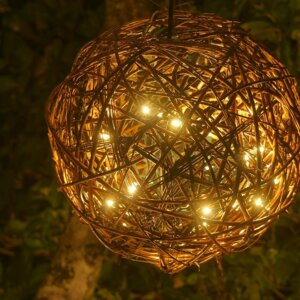
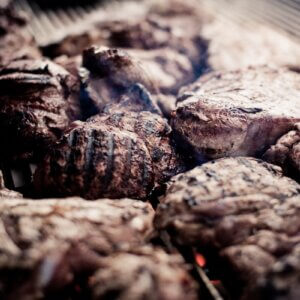



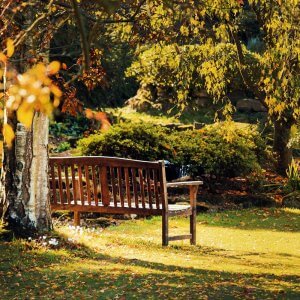


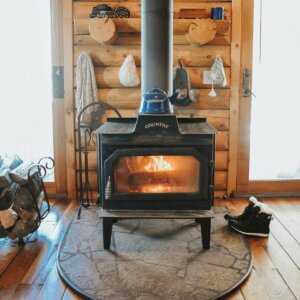




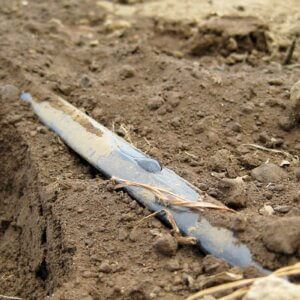

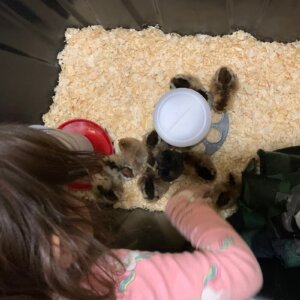











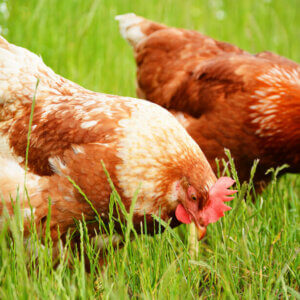



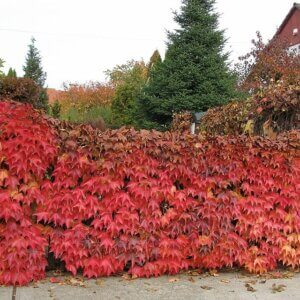
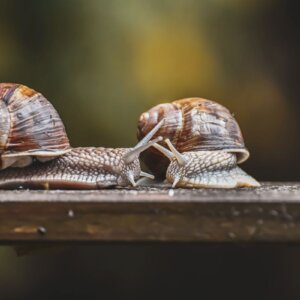




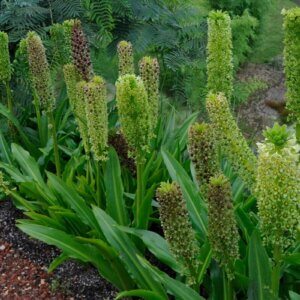

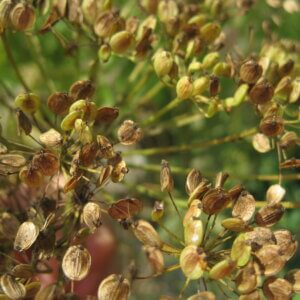
explain more about the castor oil and do you have pics of the plastic forks in the dirt?